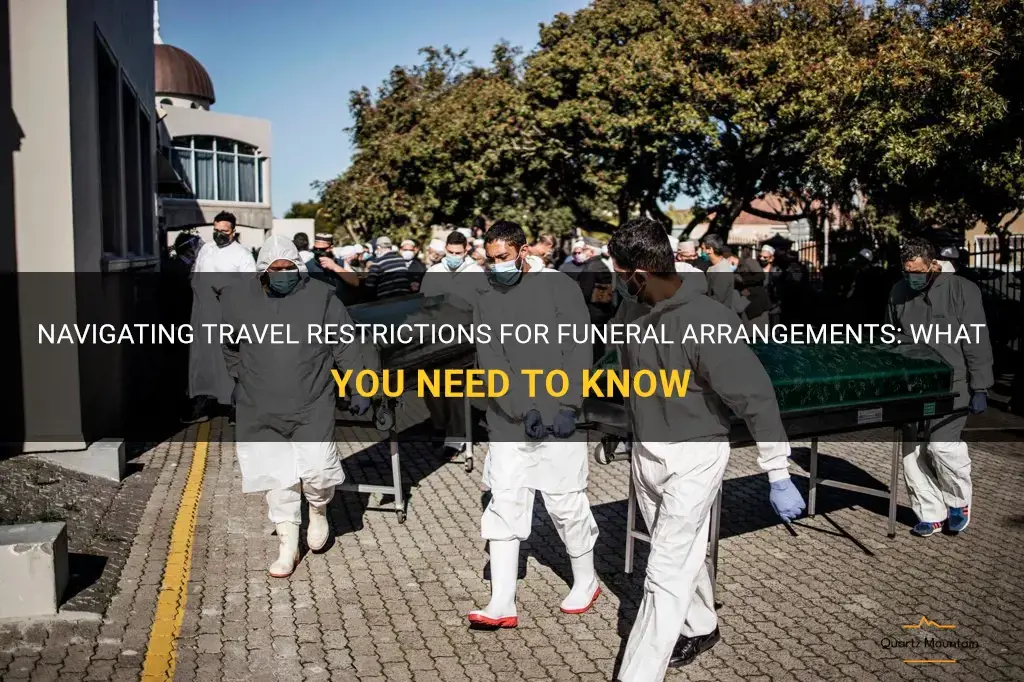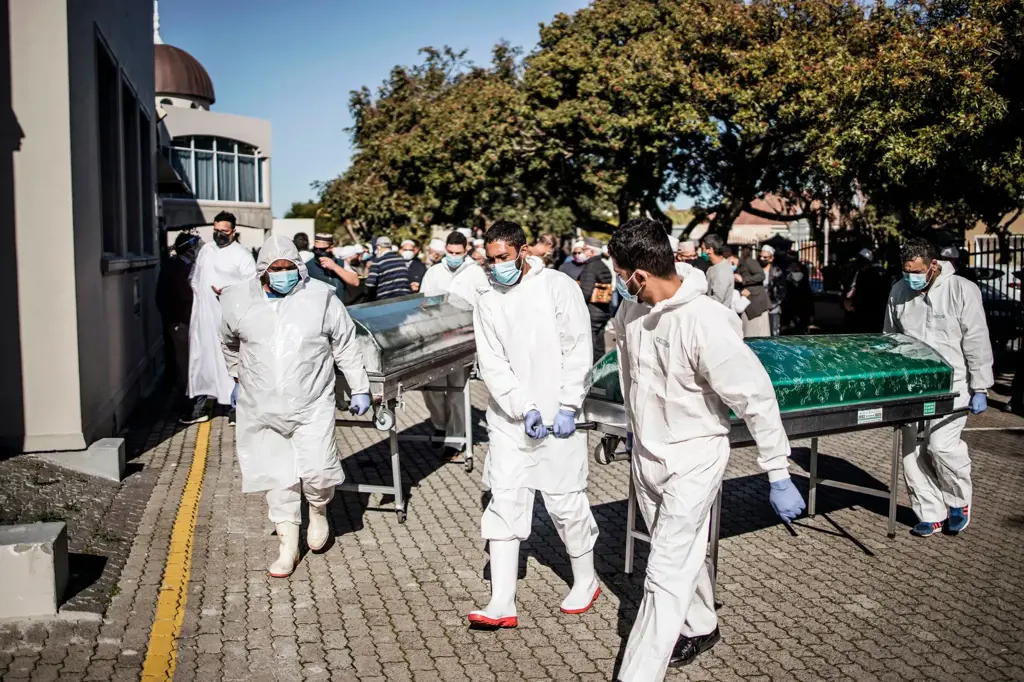
Planning a funeral is never an easy task, but the added complications brought on by travel restrictions have made the process even more challenging. With travel limitations in place around the world as a result of the ongoing pandemic, families are finding it difficult to bring loved ones home or gather together to say their final goodbyes. This has forced many to adapt and find alternative solutions, such as virtual funerals or delayed memorial services. The impact of these travel restrictions on the grieving process is undeniable, adding an additional layer of emotional strain during an already difficult time.
What You'll Learn
- Are there any travel restrictions in place that could affect attending a funeral, such as quarantine requirements or travel bans?
- How do travel restrictions vary between different countries or regions when it comes to attending a funeral?
- What resources are available for finding up-to-date information on travel restrictions related to attending a funeral?
- Are there any exceptions or special considerations for travel restrictions when it comes to attending a funeral?
- How can someone navigate travel restrictions and still be able to attend a funeral, if necessary?

Are there any travel restrictions in place that could affect attending a funeral, such as quarantine requirements or travel bans?

As the COVID-19 pandemic continues to evolve, many countries have imposed travel restrictions and quarantine requirements to prevent the spread of the virus. These measures can greatly impact one's ability to attend a funeral, as travel bans and mandatory quarantines can make it difficult or even impossible to reach the destination.
Some countries have implemented travel bans, preventing individuals from entering or leaving the country unless they have a valid reason, such as medical emergencies or essential work. Attending a funeral may not be considered an essential reason for travel in some cases, leading to restrictions on travel.
Additionally, many countries require incoming travelers to undergo a mandatory quarantine period upon arrival. This means that even if one is able to travel to attend a funeral, they may be required to quarantine for a specified number of days upon reaching their destination. This can be a significant barrier, especially for individuals who have limited time off or may have other responsibilities to attend to.
Furthermore, even if there are no travel restrictions or quarantine requirements in place at the time of travel, it's important to consider the potential risks and implications of attending a funeral during a pandemic. Funerals often involve large gatherings of people, which can increase the risk of COVID-19 transmission. It's important to prioritize the health and safety of yourself and others when making decisions about attending a funeral.
If you are unable to attend a funeral due to travel restrictions or quarantine requirements, there are still ways to show your support and offer condolences. Many funeral homes and families have started to offer virtual funeral services, allowing individuals to participate remotely. Sending flowers, cards, or other gestures of sympathy can also provide comfort to the grieving family, even if you are unable to attend in person.
It's important to stay updated on the latest travel restrictions and guidelines in your area and the destination country. Government websites and travel advisories can provide accurate and up-to-date information on any travel restrictions or quarantine requirements that may be in place. It's also a good idea to reach out to the funeral home or the family to inquire about any alternative arrangements that may be available, such as virtual services or delayed memorials.
In summary, travel restrictions and quarantine requirements can greatly impact one's ability to attend a funeral. It's essential to stay informed about the latest guidelines and regulations in your area and the destination country. If you are unable to attend in person, consider alternative ways to show your support and offer condolences.
Moldova Imposes New Travel Restrictions Amidst Rising COVID-19 Cases
You may want to see also

How do travel restrictions vary between different countries or regions when it comes to attending a funeral?

Travel restrictions vary between different countries or regions when it comes to attending a funeral. These restrictions depend on various factors such as the pandemic situation, government regulations, and cultural practices. It is important to understand these variations before making any travel plans to attend a funeral.
One of the primary factors that determine travel restrictions is the pandemic situation in the country or region. Countries experiencing a high number of COVID-19 cases may impose strict travel restrictions to control the spread of the virus. These restrictions can include mandatory quarantine upon arrival, testing requirements, and limitations on the number of people allowed to gather for a funeral. Such restrictions can significantly impact one's ability to attend a funeral, especially if they are required to quarantine for a long period.
Government regulations also play a crucial role in determining travel restrictions for attending funerals. Each country has its own set of regulations regarding international travel, and these regulations may change rapidly in response to the pandemic. Governments may impose travel bans or restrictions on specific countries or regions with a high prevalence of COVID-19. It is essential to stay updated with the latest travel advisories and guidelines issued by the government before planning any travel.
Cultural practices and traditions can further influence travel restrictions for attending funerals. Some cultures place great importance on gathering together to mourn the loss of a loved one. In such cases, government-imposed restrictions may be eased for funeral-related travel, allowing people to attend the funeral with certain precautions in place. However, it is necessary to ensure that one adheres to the guidelines and protocols set by the government and the local community to minimize the risk of spreading or contracting the virus.
Step-by-step planning and preparation can help navigate the travel restrictions for attending a funeral. Here are some key steps to consider:
- Research the pandemic situation and travel restrictions in the country or region where the funeral is taking place. Stay updated with the latest information and guidelines provided by reputable sources such as the World Health Organization or the Centers for Disease Control and Prevention.
- Check the travel advisories and regulations issued by your own government regarding international travel. Be aware of any travel bans or restrictions that may apply to your destination.
- Contact the funeral organizers or family members to understand the specific requirements or protocols in place for attending the funeral. They may have information about any local restrictions or guidelines that need to be followed.
- If there are travel restrictions in place, explore alternatives such as virtual attendance or sending condolences through other means. Many funerals now offer live-streaming options for people who are unable to physically attend.
- If you decide to travel, make sure to fulfill all the necessary requirements such as obtaining the required travel documents, undergoing testing, and following quarantine protocols if applicable.
- Take necessary precautions during your journey, such as wearing masks, practicing good hand hygiene, and maintaining physical distancing.
- Upon arrival at your destination, respect and adhere to the local guidelines and regulations. Be mindful of the local community's health and safety and follow any protocols set by the funeral organizers.
Examples of travel restrictions for attending a funeral can vary widely. For instance, some countries may require a negative COVID-19 test result taken within a certain timeframe before travel. Others may require a mandatory quarantine upon arrival, either at a designated facility or at one's own accommodation. Some countries may impose restrictions on the number of people allowed to gather for a funeral, limiting it to immediate family members only. It is important to gather specific information about the travel restrictions in the specific country or region to make informed decisions and ensure compliance.
Understanding the DFAT Travel Restrictions: What You Need to Know
You may want to see also

What resources are available for finding up-to-date information on travel restrictions related to attending a funeral?

When it comes to traveling to attend a funeral, it is important to stay informed about any travel restrictions that may be in place. These restrictions can vary by country, state, and even city, so it's crucial to find reliable and up-to-date information before making any travel plans. Fortunately, there are several resources available that can help you navigate the ever-changing landscape of travel restrictions.
One of the best resources for finding up-to-date information on travel restrictions is the official government websites of the country or region you plan to visit. These websites often have dedicated sections or pages specifically dedicated to COVID-19 travel restrictions. They provide the most accurate and current information about entry requirements, quarantine regulations, and any additional measures that may be in effect.
In addition to government websites, there are also numerous travel advisory websites that compile and update information about travel restrictions worldwide. These websites aggregate data from various sources, including government websites, news outlets, and other reliable sources. Some popular travel advisory websites include the US State Department's travel advisory website, the UK Foreign and Commonwealth Office's travel advice website, and the World Health Organization's International Travel and Health website.
Social media platforms can also be a valuable resource for finding up-to-date information on travel restrictions. Many government agencies, airlines, and travel organizations have active social media accounts where they share updates and information about travel restrictions. By following these accounts, you can receive real-time updates and notifications about any changes or new restrictions that may impact your travel plans.
It's also a good idea to consult with travel agents or funeral home staff who may have access to the latest information and can help you navigate any travel restrictions. They can provide guidance and assistance in understanding the requirements and restrictions, as well as offer alternatives or solutions if your travel plans are affected by any restrictions.
When using these resources, it is important to verify the information and cross-check multiple sources to ensure its accuracy. Travel restrictions can change rapidly, so it's always best to have the most current information before making any decisions.
To demonstrate the importance of staying informed about travel restrictions, let's consider an example. Jane, who lives in the United States, plans to attend her grandmother's funeral in Canada. She consults the official websites of both the US and Canadian governments to obtain information about travel restrictions. She learns that Canada has implemented a mandatory quarantine requirement for all travelers entering the country. Additionally, she discovers that there are specific exemptions for compassionate reasons, such as attending a funeral. Armed with this information, Jane is able to make the necessary arrangements, including providing documentation and following the quarantine guidelines, to ensure that she can attend her grandmother's funeral without any issues.
In conclusion, there are several resources available for finding up-to-date information on travel restrictions related to attending a funeral. Consulting official government websites, travel advisory websites, social media platforms, and seeking assistance from professionals can help you navigate the complex landscape of travel restrictions and ensure a hassle-free journey to attend the funeral of a loved one. It is important to stay informed, verify the information, and follow any guidelines or requirements to ensure a smooth and safe travel experience.
How Does Maryland Effectively Enforce Travel Restrictions?
You may want to see also

Are there any exceptions or special considerations for travel restrictions when it comes to attending a funeral?

When it comes to travel restrictions, attending a funeral is often considered an essential reason for travel, and many countries have exceptions or special considerations in place for people who need to travel for this purpose. However, it's important to note that the specific exceptions and regulations can vary from country to country, so it's crucial to research and understand the rules and requirements in your specific location. Here, we will discuss some general considerations and examples of special considerations that may apply when it comes to attending a funeral during travel restrictions.
- Essential travel: Most countries recognize attending a funeral as an essential reason for travel, allowing individuals to travel across borders or regions even during lockdowns or travel restrictions. This is because attending a funeral is considered a necessary and time-sensitive event for personal and emotional support to those grieving the loss of a loved one.
- Documentation: In some cases, travelers may need to provide documentation or proof of their relationship to the deceased or their need to attend the funeral. This can include a death certificate, an invitation or confirmation of the funeral service, or a letter from the funeral home or religious institution organizing the funeral. It's important to gather all the necessary documents and confirm the requirements of the country or region you will be traveling to.
- Quarantine and testing requirements: While attending a funeral may be allowed, some countries may still have quarantine or testing requirements in place for travelers. Before traveling, it's essential to check the specific regulations and guidelines of the destination country. Some countries may require travelers to undergo a COVID-19 test before or upon arrival, and others may have quarantine periods that need to be completed before attending the funeral.
- Traveling with a companion: In some cases, individuals may be allowed to travel with a companion to attend a funeral. This exception is often made to provide support and assistance to the grieving individual. However, it's important to note that the companion may also need to meet certain requirements, such as being a close family member or having a legitimate reason to attend the funeral.
- Local restrictions and guidelines: In addition to national travel restrictions, it's crucial to consider any local restrictions or guidelines that may be in place in the area where the funeral is taking place. Local governments or authorities may have specific regulations regarding the number of attendees, social distancing measures, and even specific requirements for wearing masks or personal protective equipment. It's important to stay updated on these regulations and follow them accordingly.
It's important to remember that the COVID-19 pandemic has brought about unprecedented challenges and changes to travel regulations. The rules and exceptions mentioned above are subject to change and may vary depending on the evolution of the pandemic and the specific circumstances in each country. Therefore, it's crucial to stay informed, check official government websites, and consult with travel agencies or authorities for the most up-to-date information before making any travel arrangements.
In conclusion, attending a funeral is generally considered an essential reason for travel, and many countries have exceptions or special considerations in place for individuals who need to attend a funeral during travel restrictions. However, the specific regulations and requirements can vary, and it's important to research and understand the rules and guidelines in your specific location. Documentation, testing, quarantine requirements, and local regulations are some factors to consider when planning to attend a funeral during travel restrictions. Staying informed and following the guidelines will ensure that you can offer your support and pay your respects while abiding by necessary safety measures.
Navigating Travel Restrictions in Brunswick County
You may want to see also

How can someone navigate travel restrictions and still be able to attend a funeral, if necessary?

In light of the ongoing COVID-19 pandemic, travel restrictions have become a common occurrence around the world. These restrictions, intended to curb the spread of the virus, have unfortunately led to difficult situations for individuals who need to attend funerals of loved ones. However, there are several steps one can take to navigate these travel restrictions and still be able to attend a funeral, if necessary.
- Research the travel restrictions: The first step is to gather information about the specific travel restrictions in place at your current location and the location where the funeral is taking place. This includes checking government websites, talking to travel authorities, and staying updated with the latest news related to travel restrictions.
- Communicate with the relevant authorities: Once you have a clear understanding of the travel restrictions, reach out to the relevant authorities to explain your situation. This could include contacting local embassies, consulates, or airlines to explore any possible exemptions or alternative travel arrangements that can be made.
- Seek legal assistance if necessary: If the travel restrictions are particularly strict and it seems impossible to attend the funeral, consider seeking legal assistance. Lawyers who specialize in immigration or travel law may be able to provide guidance on any legal avenues that can be pursued to ensure attendance at the funeral.
- Explore virtual options: In cases where physical attendance is not possible due to travel restrictions, consider exploring virtual options. Many funeral services now offer live-streaming of the event, allowing family members and friends to participate remotely. This can provide a sense of closure and enable individuals to pay their respects in a different way.
- Prioritize safety: While it may be difficult to accept not being able to attend a funeral in person, it is important to prioritize the safety and well-being of oneself and others. If travel restrictions are in place for valid reasons, such as high infection rates or concerns about new variants, it is crucial to respect these measures and find alternative ways to honor the deceased.
Example scenario:
Let's say a person living in Australia receives news about the sudden passing of their close family member in the United States. Due to the strict travel restrictions in place between these two countries, attending the funeral in person seems challenging.
The individual would start by researching the travel restrictions imposed by both Australia and the United States. They discover that travel between the two countries is severely limited, and entry into the United States is only permitted for specific reasons, such as essential business or emergency situations.
After understanding the restrictions, the person contacts the nearest U.S. embassy to explain their situation. They provide evidence of their familial relationship with the deceased and inquire about any exemptions or alternative travel options available. The embassy informs them that attending a funeral is considered an essential reason for travel and provides guidance on the necessary documentation and procedures.
To ensure a smooth journey, the individual seeks legal assistance, and a lawyer helps them navigate the specific travel requirements, such as obtaining a travel authorization or exemption letter. With the necessary paperwork in hand, they proceed with booking a flight and fulfilling any additional requirements mandated by the authorities.
However, let's say upon further consideration, the person realizes that the risk of traveling and potentially spreading the virus is too high. In this case, they explore virtual options for attending the funeral. They coordinate with the family in the United States to participate in the service via live-streaming or video conferencing platforms. They also plan to hold a small memorial gathering with local family and friends in Australia to honor their loved one.
In conclusion, while travel restrictions can pose significant challenges when it comes to attending funerals, understanding the limitations, seeking assistance, and exploring alternative options can help individuals navigate these restrictions effectively. Remember to prioritize safety and find ways to honor the deceased that align with the prevailing restrictions and guidelines.
Federal Employee Travel Restrictions: Navigating the Policies and Guidelines
You may want to see also
Frequently asked questions
It depends on the current COVID-19 guidelines and restrictions in place. It is important to check with the relevant authorities or the funeral home to determine if there are any travel restrictions you need to be aware of before attending a funeral.
International travel for attending a funeral may be subject to various restrictions, including visa requirements and quarantine protocols. It is advisable to check with the embassy or consulate of the country you plan to visit to understand the travel restrictions in place.
In many countries, traveling between states or regions within the same country is allowed for attending a funeral. However, it is important to check with the local authorities or relevant government websites to understand if there are any specific travel restrictions or requirements you need to meet.
Depending on the travel restrictions and regulations in place, you may be required to provide additional documents or permits to attend a funeral in another state or country. This could include proof of relationship to the deceased, a letter of invitation from the funeral home, or a negative COVID-19 test result. It is advisable to check with the appropriate authorities to understand the specific requirements.
If you are unable to attend a funeral due to travel restrictions, you can explore alternative ways to pay your respects and support the grieving family. This could include sending condolences or flowers, participating in a virtual memorial service, or reaching out to the family with your thoughts and prayers. It is important to communicate with the family and offer your support during this difficult time.







